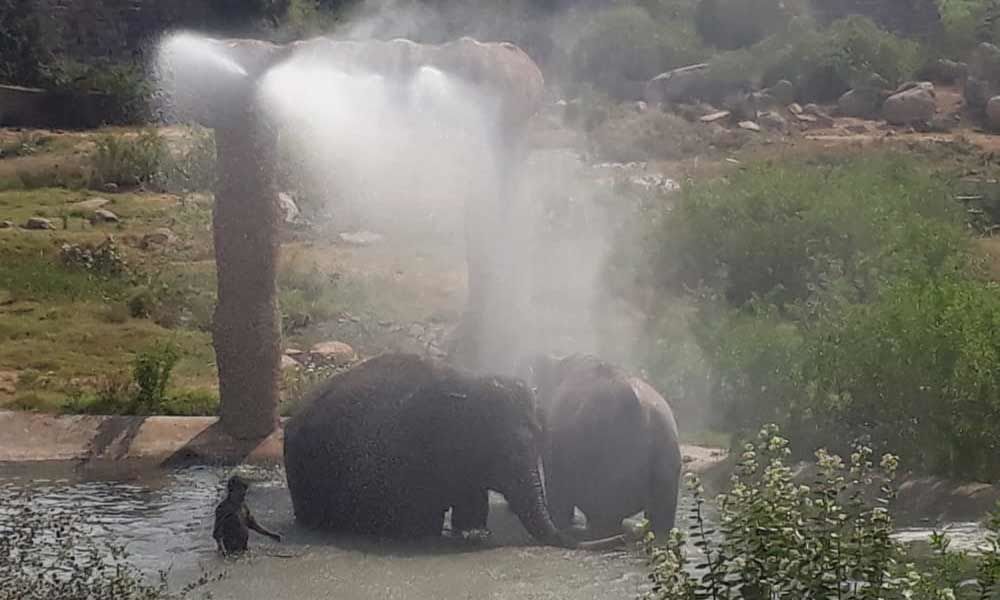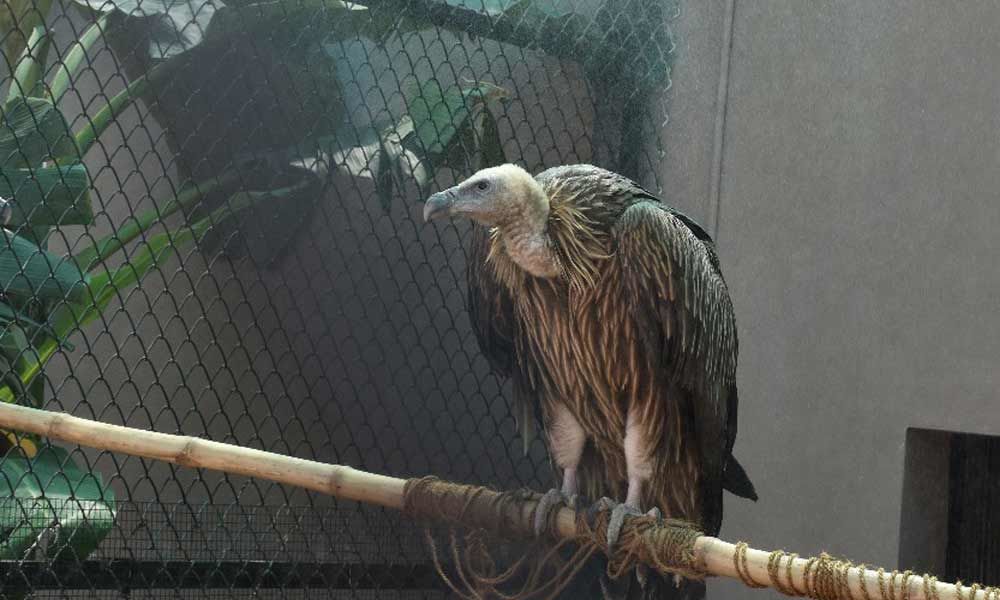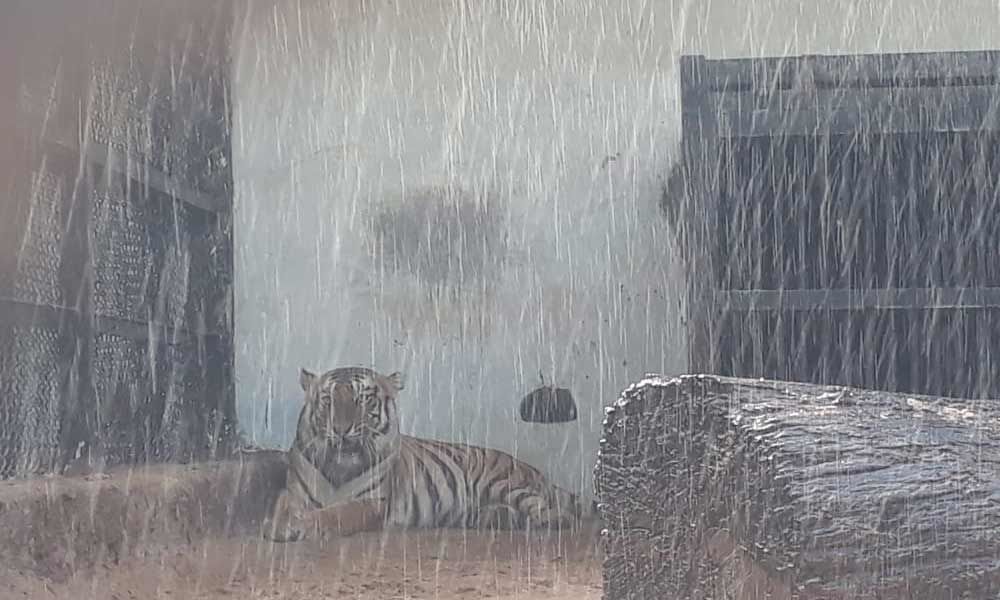Live
- GMR Airports Unveils AI-Powered Digital Twin Platform to Transform Airport Operations
- India poised to become leading maritime player: PM Modi
- Top Causes of Kidney Stones and How to Recognize Silent Symptoms
- India’s renewable energy capacity logs 14.2 pc growth at 213.7 GW
- Winter Session of Odisha Assembly adjourned sine die
- Biden calls Trump's tariff approach 'major mistake'
- After Drama Over Eknath Shinde’s Chief Minister Race, Maharashtra Cabinet Formation Faces New Tensions
- Egyptian FM, Blinken discuss recent developments in Syria
- Iran's supreme leader says Syria's developments result of US-Israeli 'plot'
- Elon Musk to Purchase $100 Million Luxury Mansion Next to Donald Trump's Mar-a-Lago, Report Reveals
Just In
Zoo inmates keep cool as staff take all measures

Bahadurpura: As part of summer arrangements and precautionary measures to prevent summer (sun) stroke and summer stress, sprinklers and small rain guns have been installed, besides foggers (Mist like falling of water) at animal enclosures at Nehru Zoological Park (NZP).
Speaking to The Hans India, besides these arrangements, more than 50 air coolers will be erected in animal enclosures like Chimpanzee, Monkeys, Tigers, Jaguars, cheetah, lions and panthers and Air condition and exhaust fans has been installed in the Nocturnal Animal House. 80% of the enclosures surroundings like windows, ventilators and doors are covered with kashkash thattis, gunny cloths to avoid direct sunlight exposure on the animals.
At least 3 to 4 times watering is being done on the kashkash thattis and thunga grass to avoid summer heat. "Our first priority is to keep them cool and content with in every season. We have a cub rearing facility in the zoo to take care of the new born of different mammals.
We never face an issue if the mother herself takes care of her new born but our worries start when she refuses to do so in certain circumstances. In such cases we have to shift the new born to the facility where all necessary precautions are being in placed to keep the neonate alive and kicking," said Syed Maqsood Mohiuddin, Assistant Conservator of Forest, NZP, Hyderabad.
Fewer mortality rates
Known for its comprehensive approach in supervising and nurturing the wild life within boundaries to keep the animals ramrod straight, the Nehru Zoological Park is working with a fewer mortality rate among inmates in the country. With a several 'quick response teams' of Veterinary Doctors, Pathologist and the Animal Keepers, this conservation facility emerge as the best operating wild life sanctuary with a state of the art approach to all type of inmates in which most of them are vertebrates varying from mammals to reptiles and amphibians to aquatics.
The supervision methods would change according to the weather wherein different teams were deployed with different tasks to keep watch on the mood and behavioral changes among the inmates.
As an entirely furnished command and control center under one roof, this conservation facility is nothing less than a home away from home for all the animals who are being nurtured and raised in various forms of cages, enclosures and aviaries. "Presently we are operating the facility with a mortality rate of 2.5 percent in comparison to other wild life sanctuaries wherein the rate stands at around 20 percent.
Behavioural changes among animals under different weather conditions keep occupy our mind all the time. We have to switch the mode of approach every time like feeding, administering medicines and monitoring the behaviour of the beasts, birds and reptiles with every slightest apprehension of weather influence on the animals.
We undertake de-worming initiatives to sooth the mood of the beats. Sprinkling of bleaching powder on walls and vaccinations also carried out inside and outside of the premises beside prophylactics to prevent diseases among animals. Not to mention the sprinkling of water using air coolers and foggers in there enclosures to keep them stay cool in summer season which saw as a great concern with the heat wave persist," he said.
When asked about the teams working together to keep an eye on the wild beats, the ACF informed that "the NZP has signed Memorandum of Understanding (MoU) with the Veterinary Biological Research Institute (VVRI) and Laboratory conservation in endanger species (LACONES) to check diseases and damages caused to animals under harsh weather conditions.
We coordinate each other to take care of the health and behavioural change among inmates by undertaking various clinical tests and laboratory interpretations. "Also, have a tie up with Professor Jaishanker Telangana State Agricultural University, Rajendranagar, whose help in the form of Pathologists and Specialists comes to rescue in examining the condition of mammals and other species facing health issues," he elaborated.

© 2024 Hyderabad Media House Limited/The Hans India. All rights reserved. Powered by hocalwire.com









